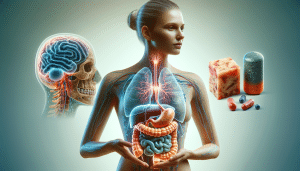Unlocking the Secrets of Gut Health for Vibrant Living
Ella Knight October 31, 2025
Many people discover how taking charge of their gut health can affect energy, mood, digestion, and immune function. Explore what the science says about gut-friendly foods, prebiotics, probiotics, and lifestyle habits that play a powerful role in wellness and healthy living.
The Gut Microbiome and Why It Matters
The gut microbiome refers to the trillions of bacteria, viruses, and fungi living in the digestive tract. These microbes play a vital role in breaking down food, synthesizing vitamins, and protecting against harmful pathogens. A balanced microbiome supports not just digestion but overall health as well. Disruptions can influence everything from mood to metabolism, skin health, and immune system strength. Many emerging studies reveal how intricate the gut-brain connection truly is.
Gut microbiota diversity is a key factor in maintaining wellness. People with more diverse gut bacteria often report better digestive health, higher energy, and fewer chronic complaints. Factors like antibiotic use, high-sugar diets, and chronic stress can disturb microbial diversity. Conversely, fiber-rich diets, fermented foods, and adequate hydration encourage a flourishing internal ecosystem.
Scientists continue to identify links between the gut and physical as well as emotional well-being. For example, the production of short-chain fatty acids by beneficial microbes influences immune health and inflammation. Learning about microbiome health opens opportunities for making daily choices that naturally encourage a vibrant life. Supporting gut health can be an essential part of a balanced wellness routine for many people.
Foods That Support a Healthy Gut
Choosing the right foods every day can dramatically influence gut health. Fiber-rich choices, including whole grains, beans, lentils, vegetables, and berries, act as prebiotics. These fibers feed beneficial bacteria and stimulate their growth. Regularly including a variety of plant-based foods in meals can improve digestive comfort and prevent bloating or irregularity.
Probiotics found in foods like yogurt, kefir, kimchi, sauerkraut, and miso offer living cultures that may help populate the gut with friendly microbes. While the effect of each food varies, including diverse fermented options provides many potential benefits. Cultured dairy and plant-based options can be incorporated as part of breakfast bowls, snacks, or side dishes to make gut-friendly eating enjoyable and accessible.
Beyond individual foods, meal patterns matter. Eating slowly, chewing thoroughly, and maintaining regular meal times can support digestion and microbial balance. Limiting highly processed products, excessive added sugars, and artificial sweeteners may also reduce disturbance to the microbiome. Exploring recipes that highlight seasonal produce and fermented foods can bring variety and flavor alongside health protective effects for the gut.
Understanding Prebiotics and Probiotics
Prebiotics and probiotics are often discussed together, but they serve unique functions in gut health. Prebiotics are non-digestible fibers and compounds that stimulate the activity and growth of beneficial gut bacteria. Foods like garlic, onions, asparagus, oats, and bananas all offer prebiotic nutrition. By feeding healthy bacteria, these fibers indirectly support a thriving digestive environment.
Probiotics are live microorganisms that, when consumed in adequate amounts, can confer health benefits on the host. Not all probiotics are created equal—different strains of bacteria have distinct effects. Some may help with lactose digestion, while others support immune response or gastrointestinal comfort. Selecting several kinds of probiotic foods, or consulting with a healthcare professional about supplements, can help tailor an approach to individual gut needs.
Combining prebiotics and probiotics—a practice sometimes called “synbiotics”—may amplify their effects. For example, eating yogurt with sliced bananas or adding inulin-rich chicory to fermented salads provides both the food for good bugs and the bugs themselves. Focusing on this combination can help cultivate a resilient and dynamic gut ecosystem, which in turn may contribute to better mood, immunity, and digestion (see also Harvard T.H. Chan School of Public Health).
Lifestyle Factors Impacting Gut Wellness
Diet plays a central role in gut health, but lifestyle habits matter as well. Chronic stress can disrupt both digestive comfort and the makeup of the microbiome over time. Mindfulness practices, restful sleep routines, and regular movement all support a stable digestive environment. Even gentle exercises, such as walking or yoga, aid gut motility.
Hydration is often overlooked. Water keeps the digestive tract moving and helps prevent constipation. For some, herbal teas or broths provide hydration with additional digestive benefits. Limiting excessive caffeine and alcohol can also help maintain a balanced gut. Moderation in all things proves supportive for gut health in the long run.
Antibiotic use is sometimes necessary, but using these medications without medical need can reduce beneficial bacteria populations. After any antibiotic course, focusing on prebiotic and probiotic foods may help restore microbial balance. Creating rhythms in sleep and physical activity, while avoiding disruptions, supports microbial stability (see National Institute of Diabetes and Digestive and Kidney Diseases).
Recognizing Signs of an Unbalanced Gut
Subtle digestive symptoms can hint at a gut in need of support. Frequent bloating, irregularity, heartburn, or persistent stomach discomfort may suggest microbial imbalance. While many causes exist, tracking symptoms and noting patterns can guide helpful changes in diet or lifestyle.
Beyond digestion, signs of gut disruption can include skin challenges, frequent colds, low energy, or mood fluctuations. Since the gut produces neurotransmitters like serotonin, supporting its health can positively affect both physical and mental well-being. Consulting healthcare providers is recommended for ongoing or severe symptoms.
Simple strategies—such as gradually increasing fiber intake, adding fermented foods, or reducing ultra-processed snacks—can often resolve mild issues. For those experiencing persistent digestive challenges, monitored elimination diets or guided testing may offer insight. Seeking evidence-based recommendations and tracking changes over time proves empowering for many on the gut health journey.
Building Sustainable Gut Health Habits
Long-term gut health flourishes with consistency rather than extremes. Small, sustained changes—like choosing whole foods over refined choices, building routines around meal and sleep times, and managing stress thoughtfully—pay dividends for microbiome vitality. Flexibility is important, too; forgiving slip-ups and returning to positive habits makes healthy living attainable for real people.
Exploring new culinary traditions that prioritize plant diversity and fermentation opens doors to a wider range of gut-friendly nutrients. Involving loved ones in meal prep and savoring food together enhances both emotional and digestive satisfaction. Regular check-ins on how energy, mood, and digestion respond to dietary shifts can provide personal motivation to keep gut health at the forefront.
Gut health is not a one-size-fits-all process. Listening to your body, leveraging credible resources, and adjusting routines based on feedback allows for an adaptive and enjoyable wellness journey. The path toward a healthy gut can support lifelong vibrancy, resilience, and a more empowered sense of well-being.
References
1. National Institutes of Health. (n.d.). Human Microbiome Project. Retrieved from https://commonfund.nih.gov/hmp/overview
2. Harvard T.H. Chan School of Public Health. (n.d.). The Nutrition Source: Probiotics & Prebiotics. Retrieved from https://www.hsph.harvard.edu/nutritionsource/probiotics-and-prebiotics/
3. National Institute of Diabetes and Digestive and Kidney Diseases. (n.d.). Digestive Diseases. Retrieved from https://www.niddk.nih.gov/health-information/digestive-diseases
4. Mayo Clinic. (n.d.). Digestive Health: Tips for a Healthier Stomach. Retrieved from https://www.mayoclinic.org/healthy-lifestyle/nutrition-and-healthy-eating/in-depth/digestive-system/art-20047420
5. Cleveland Clinic. (n.d.). Gut Microbiome: What Is It and How Does It Affect Your Health? Retrieved from https://my.clevelandclinic.org/health/articles/21207-gut-microbiome
6. Johns Hopkins Medicine. (n.d.). The Brain-Gut Connection. Retrieved from https://www.hopkinsmedicine.org/health/conditions-and-diseases/the-brain-gut-connection







